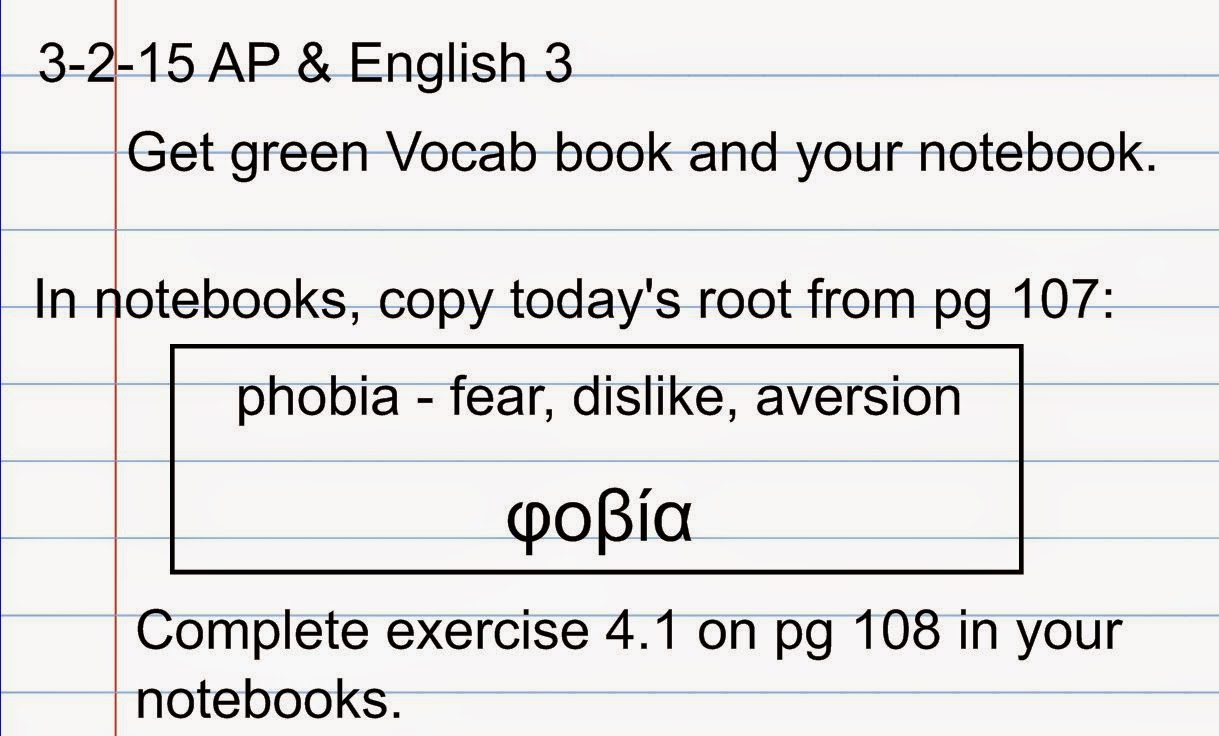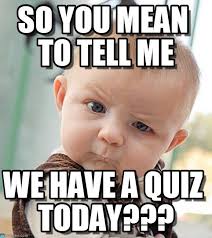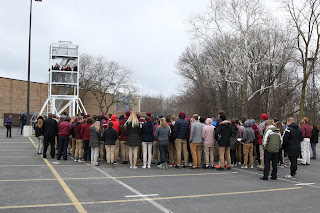Day 124: It's all Greek to them
This week I've been battling a nasty head cold my husband kindly shared with me. We have one more week before spring break. I'm planning to start Literature Circles with my AP English kids next week, but until then I have about five days of nothing on my lesson plans. It's that point of the year where I feel like I'm hanging on for dear life. The weather is still nasty (we had 2-hour delay today for ice), the kids are squirrelly, there are tons of kids out for spring sports and extracurriculars, and I have no vacation days to fall back on. I kind of just want to show movies for a week, but I can't. I hate wasting precious class time, especially with the end of the year really quite close (ten school Mondays left, actually), but I'm in survival mode until I can recharge over spring break. I'm feeling the stress of teaching multiple classes; I can usually squeak out a viable plan for two of my three classes, but one is getting a crappy lesson every day...so I've been messing around with some less English-y lessons, especially in my AP English classes. I'm now teaching classical languages, starting with Greek.
We started a neat unit this week in my English classes that will continue through April on Greek roots in vocabulary. We got these neat vocab books this year that are jam-packed with cool vocabulary lessons. In order to add a 'hook' to starting the chapter on Greek roots, I started class on Monday asking for volunteers. A student would raise her hand, and I'd turn to the smart board and write her name using the Greek alphabet. I'd ask for another volunteer, and then write that student's name on the board in Greek. They started to catch on and get really excited: "Do mine! Do Sarah! Do Ethan!" I then passed out copies of the Greek alphabet for them to paste in their notebooks. We talked about how there is no J or F or Y, and they marveled over the different letters. I took one semester of Biblical Greek at my parochial high school, which is now coming in handy as I recall using the Greek alphabet. My students are very impressed at my miniscule amount of knowledge.
Each day we do a different Greek root which they copy down in English and in Greek. They come in, grab their notebooks and vocab books, and do the exercise that uses some of the root words. I love how this unit is set up because it allows for students to memorize roots to help decipher word meaning, as opposed to sheer memorization of tons of words. I'm already seeing the connections they're making.
Monday started with "phobia." Words included obvious ones like claustrophobia or agoraphobia, and how using the ending -phobe means a person with that aversion, e.g. Russophobe is someone who is against Russians or Russia. We pulled up a giant phobia list and they laughed at how words exist to describe fear of cats, children, or "Walloons." I explained how it doesn't just mean "fear" but can also mean "dislike or aversion to." Someone who might be described as homophobic isn't typically terrified of gay people like one might be terrified of the dark, just averse to the lifestyle. someone who has photophobia may have just gotten his eyes dilated and is adverse to light.
Tuesday was "phil" - love of. Philogyny = love of women. -Gyn-, like gynecologist is a lady doctor. They connected that pedophile literally means "lover of children." Ped = child, like how a pediatric doctor works with children. They were a little grossed out that pedophile and pediatrician were related in Greek. A philanthropist is a lover of humanity; "anthro" is 'man' or 'mankind.' Anthropology is the study of mankind. So what is someone who both gives generously and studies mankind? A philanthropologist. When I said this, I thought I was making it up, but a student googled it and apparently it is a real word.
Wednesday was "mis" - hatred of. Misogyny = hatred of women. Misandry = hatred of men. I then asked them what androgynous meant. They worked out the meaning based on what they already knew - someone who had both male and female features. Misogamy = hatred of marriage, like polygamy or monogamy. Misoneism = hatred of new things. Neo = new. I asked what a fear of new things was. First someone guessed "misoneophobia." I told them that would be the fear of the hatred of new things. They corrected themselves to "neophobia." One student described our process like we were "creating a secret code."
Today was "Dys-" - ill, bad, difficult - and "Eu-" - good, well. Dystopia. Euphonious. In the space of four days, they have basically learned the skills to identify dozens of words and make connections. Even though we haven't done any English-y stuff that I had hoped to have done, in terms of practicing for the AP test or getting into Huck Finn with English 3, at least I know they have accomplished a great deal more this week than I had felt capable of teaching them with my foggy head cold. It's been a good week, even in survival mode.
--------------
Note: I am a participant in the Amazon Services LLC Associates Program, an affiliate advertising program designed to provide a means for us to earn fees by linking to Amazon.com and affiliated sites.
We started a neat unit this week in my English classes that will continue through April on Greek roots in vocabulary. We got these neat vocab books this year that are jam-packed with cool vocabulary lessons. In order to add a 'hook' to starting the chapter on Greek roots, I started class on Monday asking for volunteers. A student would raise her hand, and I'd turn to the smart board and write her name using the Greek alphabet. I'd ask for another volunteer, and then write that student's name on the board in Greek. They started to catch on and get really excited: "Do mine! Do Sarah! Do Ethan!" I then passed out copies of the Greek alphabet for them to paste in their notebooks. We talked about how there is no J or F or Y, and they marveled over the different letters. I took one semester of Biblical Greek at my parochial high school, which is now coming in handy as I recall using the Greek alphabet. My students are very impressed at my miniscule amount of knowledge.
Each day we do a different Greek root which they copy down in English and in Greek. They come in, grab their notebooks and vocab books, and do the exercise that uses some of the root words. I love how this unit is set up because it allows for students to memorize roots to help decipher word meaning, as opposed to sheer memorization of tons of words. I'm already seeing the connections they're making.
 |
| My smartboard bell work instructions |
Tuesday was "phil" - love of. Philogyny = love of women. -Gyn-, like gynecologist is a lady doctor. They connected that pedophile literally means "lover of children." Ped = child, like how a pediatric doctor works with children. They were a little grossed out that pedophile and pediatrician were related in Greek. A philanthropist is a lover of humanity; "anthro" is 'man' or 'mankind.' Anthropology is the study of mankind. So what is someone who both gives generously and studies mankind? A philanthropologist. When I said this, I thought I was making it up, but a student googled it and apparently it is a real word.
Wednesday was "mis" - hatred of. Misogyny = hatred of women. Misandry = hatred of men. I then asked them what androgynous meant. They worked out the meaning based on what they already knew - someone who had both male and female features. Misogamy = hatred of marriage, like polygamy or monogamy. Misoneism = hatred of new things. Neo = new. I asked what a fear of new things was. First someone guessed "misoneophobia." I told them that would be the fear of the hatred of new things. They corrected themselves to "neophobia." One student described our process like we were "creating a secret code."
Today was "Dys-" - ill, bad, difficult - and "Eu-" - good, well. Dystopia. Euphonious. In the space of four days, they have basically learned the skills to identify dozens of words and make connections. Even though we haven't done any English-y stuff that I had hoped to have done, in terms of practicing for the AP test or getting into Huck Finn with English 3, at least I know they have accomplished a great deal more this week than I had felt capable of teaching them with my foggy head cold. It's been a good week, even in survival mode.
--------------
Note: I am a participant in the Amazon Services LLC Associates Program, an affiliate advertising program designed to provide a means for us to earn fees by linking to Amazon.com and affiliated sites.





Comments
Post a Comment